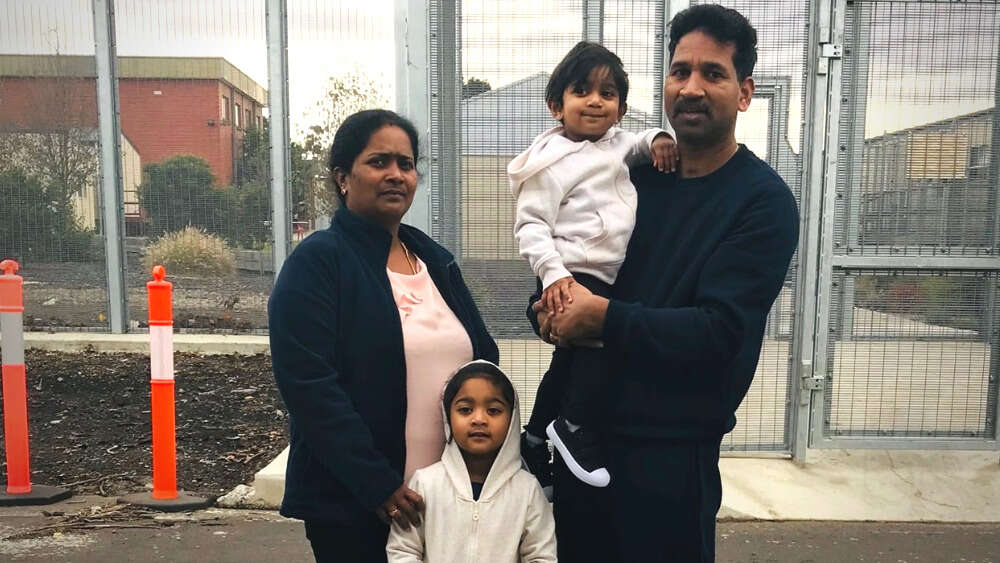Home to Bilo: How a four-year-old is challenging the soul of a nation
When I sat outside the Port Hedland immigration detention centre in 2002, I wept and was left to wonder what the policy of mandatory detention of asylum seekers was doing to the soul of Australia.
Almost twenty years later, the answer has become distressingly clear.
The life of a four-year-old has been testing the health of our national character, especially as the government remains non-committal about her family’s fate, even as they are reunited in Perth.
Tharnicaa, though born here in Australia, has grown up in a detention centre. Her seven-year-old sister, Kopika, has been escorted to and from school by security guards, returning every afternoon to a captive life. The girls live with their parents, Nades and Priya, in a multi-million-dollar facility.
At a time when millions of people in other parts of the world are crying out for assistance a country like Australia is well placed to offer, we’ve spent millions keeping one family in detention. A family who’ve committed no crime, according to Australian or International law.
Their story is complex. Nades and Priya are Sri Lankan Tamils. They fled persecution individually in the early 2000s. Priya fled after seeing her fiancé burned alive by Sri Lankan authorities. The couple met here and their two daughters were born in Australia.
Biloela is a very small town in central Queensland. I’ve been there. The family are beloved members of this tight knit community who’ve been campaigning for their release since the Australian Border Force took them from their home in 2018.
Now, four-year-old Tharnicaa and her sister have become hauntingly emblematic of Australia’s asylum seeker policy. Last week, they were back in news headlines after Tharnicaa had to be flown to Perth for medical treatment after suffering sepsis on Christmas Island. It took ten days for her parents’ concerns to be taken seriously. Ten days.
As a fellow human being, I find their story agonizing to witness. As a Christian committed to following Jesus, I admit it is gut-wrenching. How have we arrived in this place where a four-year-old is perceived as a threat to our borders?
When I say I am a follower of Jesus, I mean that I am a disciple of the way of love he embodied. A love that sought out and brought in those on the margins, those endangered by the prejudice of others. A love that drew children into a place of value and purpose. A love that perpetuated kindness, mercy and justice even when it was politically uncomfortable.
I often try to cut politicians in these stories some slack. I’ve tried to understand the pressure around the concept of ‘borders’. I am conscious of the size and complexity of these issues. With more than seventy million people displaced around the world today no decisions are straight-forward.
When we sing about boundless plains without thinking about families like Tharnicaa’s, we are allowing the slow corrosion of our hearts.
Despite finding some ‘sympathy’ for the decision makers, I can’t help but shake my head every time I hear the second verse of our national anthem: ‘For those who’ve come across the seas, we’ve boundless plains to share’. We, as a nation, are not ‘at capacity’. The town of Biloela has room in its heart for the Nadesalingam family.
Yes, the family is being released into community detention in Perth, but the term ‘released’ still feels heavy. Though it is wonderful that Tharnicaa is being reunited with her sister and her father, this story is a long way from resolved. Temporary protection feels oxymoronic. Do we temporarily feed people, or provide them with temporary love?
This family is out of off-shore detention, and that’s good news. But their future is no more certain – the threat of detention or deportation remain. They are no closer to going home to their friends and lives in Biloela.
When we sing about boundless plains without thinking about families like Tharnicaa’s, we are allowing the slow corrosion of our hearts. We must not look away from the cruelty embedded in Australia’s border protection policies.
The difficulty for policy makers today is that asylum seekers now have a very memorable face. The age-old strategy of stripping people of their identity, labelling ‘them’ as something to be feared by ‘us’ is failing.
In 2002, I was astonished that my country could be so cold. That coldness seems now to have taken root and is sprouting some hideous fruit.
However we got to this point, for the sake of vulnerable people, and for the sake of our national heart and soul, we surely need a different path.
Meredith Wright is a mother of three daughters and a writer for Baptist World Aid Australia.
She can be reached at [email protected]
This article originally referred to the family as the Murugappan family, but having been made aware of the following update from the Home to Bilo campaign we are retrospectively editing our articles:
“This family’s name is Nadesalingam. Tamil people commonly take the husband/father’s first name as their family name, in preference to surnames which are closely associated with castes.
For many years, the #HometoBilo campaign avoided using Nades, Priya, Kopika and Tharnicaa’s full names, for fear that this would further compromise the family’s safety and security if the former government forced them to danger in Sri Lanka.
We are grateful to journalists and media outlets who are addressing the family using the correct family name, Nadesalingam.”


